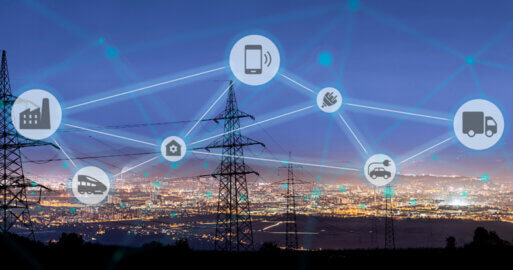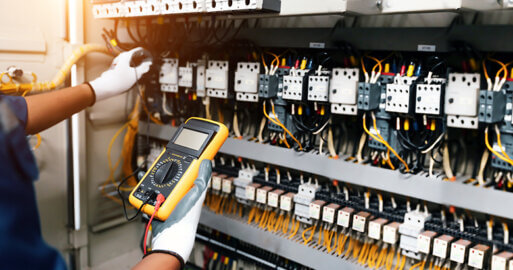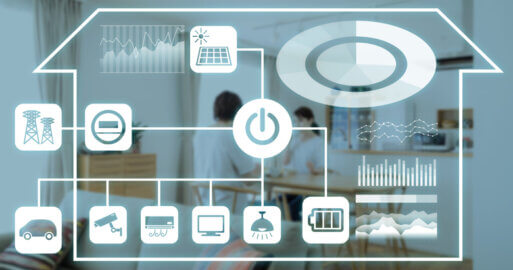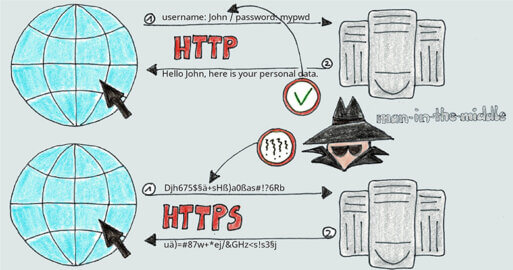Digital Transformation in the German Power Industry, Part 1/3: A short history – from liberalisation to smart meters
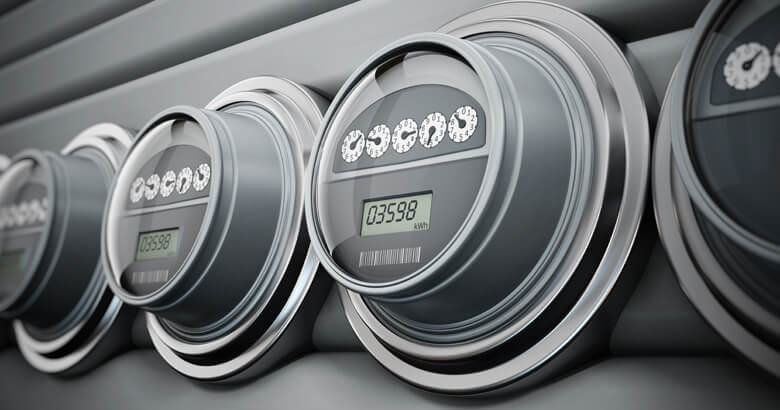
The German energy markets have gone through a huge transformation. From market liberalisation, via decentralising power plants and a shift from fossil fuels to renewable energy sources, the flexibility now required is a challenge for all involved. These days, the power companies need to balance supply and demand, while exploring and adopting new technical innovations. Digitalising the power industry could be the key to managing these challenges. The new energy world is full of opportunity. New, future-proof business models are springing up. Digitalisation offers the power industry a wealth of opportunities.
These opportunities are the subject of this three-part blog series by our guest author, Tobias Hevekerl, Senior Consultant at econtea GmbH, Berlin. Beginning with a short history of the power industry, in part two he’ll be looking at new business models. In part three, he deals with the opportunities and threats of digital transformation in the power industry, as well as the question of approaches to digitalisation and its drivers. You will also discover how econtea and SEEBURGER can accelerate digitalisation for power suppliers and what services and solutions they offer to support those in the energy markets.
In the past 20 years, the German energy market has experienced drastic change. This peaked with a 2016 law on the digital transformation of the energy sector.[1] What has happened so far on the road to digitalisation in the energy sector, and what new opportunities have arisen?
What has changed since the energy markets were liberalised in 1998?
Liberalisation of the electricity and gas markets
Before 1998, the world of the German energy suppliers was quite different to that of today. Each company supplied a clearly defined area. Customers had a single energy supplier for their area. Nothing could go wrong in this monopoly. There was, however, some competition in the heating fuels market, where natural gas had to compete against oil.[2]
In 1998, it was decided to liberalise the Germany energy market, and an amendment to the energy act was passed.[3] This liberalized both the electricity and gas markets. The monopolies were broken up in favour of a free market, which was opened up to a large number of different suppliers. Electricity customers have been able to choose their electricity provider freely ever since. Gas customers, however, had to wait until 2007 for the gas market to fully open.[4]
Moving away from nuclear power – a powerful transformation
Following the nuclear disaster in Fukushima, Japan, in March 2011, Germany decided to phase out its nuclear power.[5] There had been calls before to abandon nuclear power, including after the Chernobyl catastrophe of 1986. However, this time, then Chancellor Angela Merkel felt compelled to act.
Renewable energy
Once it had been decided to phase out nuclear power, it was clear that Germany would need other energy sources to cover its energy needs. There were fossil fuels, such as coal. It was also decided to push and subsidise renewable energies such as solar and wind power. In 2000, shortly after the liberalisation of the electricity market, a renewable energies act (EEG) was passed, and has since been much amended.[6] This paved the way for free trade in the electricity sector and a decision to promote solar panels and wind power.
Renewable energy sources drive digitalisation in the power industry
The government’s decision to promote renewable energies had a massive impact on digitalisation within the energy industry. Suddenly, the industry needed technologies and processes which would intelligently and securely collect, use and analyse data. They would also form the basis for new supply concepts and business models.
Smart Grid
Renewable energy farms are much smaller and more decentralized than traditional power plants. At the same time, the amount of power solar and wind farms feed into the grid fluctuates. This inconsistency in supply requires a high degree of coordination and control throughout the grid. Digitalisation gives the power industry opportunity to better structure, align and simplify their processes. By purposely collecting data on supply and demand, we can make the grid more stable. Efficient power plants can step in when needed for a flexible, additional supply.
However, the above requires a grid which intelligently networks regions with differing supply and consumption rates. Capacitors of various sizes and storage periods provide the flexibility to adjust the supply to consumers as required. The future will be a holistic concept that smartly connects energy suppliers and energy consumers. Through intelligent energy management, energy consumers can also become energy suppliers. One example is in electro mobility, where the energy stored in the battery can be used in number of ways and places. Another example is the opportunities offered through smart home or smart living technology, which make it possible, for example, to run dishwashers and washing machines during off-peak times when there is less load on the grid. We will look at these opportunities in more detail in part two.
Networking individual units into a smart grid and coordinating these so that there is secure supply and demand has only been conceivable since the advent of modern communication technologies. [7] The transformation of the energy industry would not have been possible without a smart grid.
Smart Meter
An initial step towards the digital transformation of the energy system was the German act on digitalisation in the energy industry, passed in 2016. One result of this was a nationwide roll out of smart meters.[8] The increasingly intelligent power grids are characterised by a growing mass of process and measurement data. This not only means a fundamental structural change for the energy providers. It is also an opportunity to develop new, data-driven business models and to reposition themselves in the market by offering innovative services
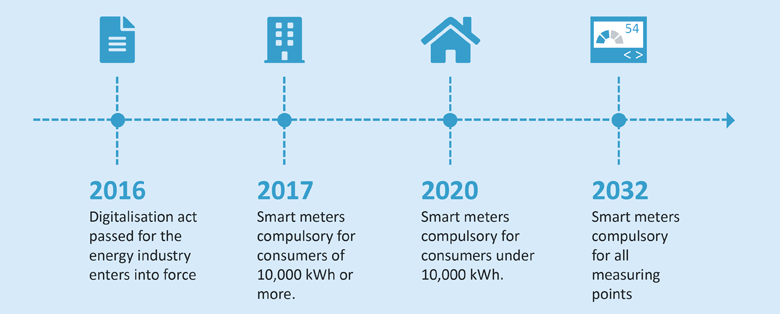
On the one hand, smart meters and a smart grid enable you to intelligently coordinate the power supplied by renewable energy farms and to balance out the supply fluctuations from wind and solar power. [10] On the other hand, they can help you intelligently control energy consumption and to cushion peak loads. In contrast to the traditional meters, which were read once a year, smart meters can share current energy consumption on demand, which gives energy providers a far clearer picture of their customers’ energy usage. These digital technologies help reduce bottlenecks and to keep the system stable and flexible. At the same time, they allow you to redesign tariffs and to offer incentives to use power at quieter times of the day or night, when it’s cheaper. Customers could benefit from a clearer picture of how the load changes throughout the day, and maybe even negotiate an individual tariff with their energy provider![11]
Smart meters are just the beginning, and necessary to enable a number of new business models which accompany the digital transformation of the energy industry. Discover more about these new business models in the energy industry in part two of this blog series.
How can econtea help?
We at econtea offer consulting services to help you see the opportunities, discover new business opportunities and analyse the risks in digitalisation.
Econtea supports organisations in keeping up-to-date and designing their own future with modern processes and solutions. Our portfolio includes:
- Project and programme management
- Digitally transforming business models
- Digitalising processes
- Analysing processes and cost optimisation
We consult on and help you introduce:
- Cloud services
- Solutions for e-invoicing (ZUGFeRD, XRechnung, Peppol and more)
- Middleware and integration solutions
- New technologies (Blockchain, DLT, NLP, RPA and more)
- Data protection, IT security and digital ethics
How can SEEBURGER help you?
SEEBURGER, the parent company behind econtea, has over 35 years’ expertise in business integration and offers smart solutions and other solutions for industries including the power industry.
Benefit from comprehensive technical consultancy, versatile products, flexible, efficient software solutions as well as dependable project support as you adopt the technologies of the future. SEEBURGER can help you truly grasp the opportunities in digital transformation and lead your company into a networked future.
The Business Integration Suite (BIS) is at the centre of SEEBURGER’s solutions. It enables your organisation to react quickly, flexibly and innovatively to the demands of digital transformation. SEEBURGER customers use the Business Integration Suite (BIS) to:
- Network across companies (B2B-Integration)
- Marketing communications as per BNetzA and edi@energy standards
- Fulfil legal reporting requirements in post trading
- E-Invoicing
- Easily integrate SAP IS-U and other industry-specific solutions
- Integrate individual processes
- Securely exchange data within and beyond the organisation (MFT)
- Efficiently administrate interfaces through API management
[1] cf. Bundesministerium für Wirtschaft und Energie: Gesetz zur Digitalisierung der Energiewende [Digitalisation of a Transformed Energy Sector Act] (accessed 13.09.2021).
[2] Vgl. EnBW: Geschichte der Liberalisierung [History of Liberalisation] (accessed 13.09.2021).
[3] cf.Directive 98/30/EC of the European Parliament and of the Council of 22 June 1998 concerning common rules for the internal market in natural gas. (accessed 13.09.2021).
[4] Cf.. Joachim Wieland: Rechtsprobleme der Gasnetzbewertung nach der Gasnetzentgeltverordnung [Legal Issues in the Gas Network Following the Gas Charges Ordinance]. Peter Lang, 2008, ISBN 978-3-631-58542-9.
[5] Cf. Draft bill from the German government: Referentenentwurf für ein Achtzehntes Gesetz zur Änderung des Atomgesetzes. [Draft of an 18th amendment to the Nuclear Act] (accessed 13.09.2021).
[6] Cf.. Bundesministerium für Wirtschaft und Energie: Das Erneuerbare-Energien-Gesetz [The Renewable Energy Sources Act] (accessed 13.09.2021).
[7] Cf. Megatrend „Digitale Energiewende“: Chancen und Grenzen. [Major Trends: The Digital Transformation of the Power Industry, Opportunities and Limits] (accessed 13.09.2021).
[8] Cf. Bundesministerium für Wirtschaft und Energie: Smart Meter: Intelligente Messsysteme für die Energiewende. [Smart Meters: Intelligent Measuring Systems for a Transformed Energy Industry] (accessed 13.09.2021).
[9] cf. E.on: Smart Meter Pflicht: Stromzähler werden intelligent. [ Compulsory Smart Meters: Electricity Meters are Getting Intelligent] (accessed 13.09.2021)
[10] cf. Carsten Schultz, Julia Kroh and Heiner Lütjen: Innovationen in der Energiewirtschaft sind machbar! Innovationsmanagement als Erfolgsfaktor von Energieversorgern [ Innovation is Possible in the Energy Industry! Innoation Management as Success Factor for Energy Suppliers] (accessed 13.09.2021).
[11] cf. Megatrend „Digitale Energiewende“: Chancen und Grenzen. [Major Trends: The Digital Transformation of the Power Industry, Opportunities and Limits] (accessed 13.09.2021).
Thank you for your message
We appreciate your interest in SEEBURGER
Get in contact with us:
Please enter details about your project in the message section so we can direct your inquiry to the right consultant.
Written by: Tobias Hevekerl
Tobias Hevekerl joined econtea GmbH in April 2016 and is a senior consultant, supporting utilities customers in project management, writing product requirement documents, running proofs of concept, optimising processes and product and test management. He advises the SEEBURGER product management team on the company‘s Trade Reporting Solution and RRM+. Following a traineeship in the commercial arm of an energy company and a degree in business informatics, from 2007 Tobias Hevekerl worked for two consultancies where he specialised in the utilities sector. In his free time, he likes to go hiking, jogging or cycling in the countryside. He also has a taste for adventure. He is a versatile sportsmen, enjoying mountain biking, climbing, zip lining, wall running, tackling high ropes courses, football and – unusually for a North German – skiing and snowboarding.
